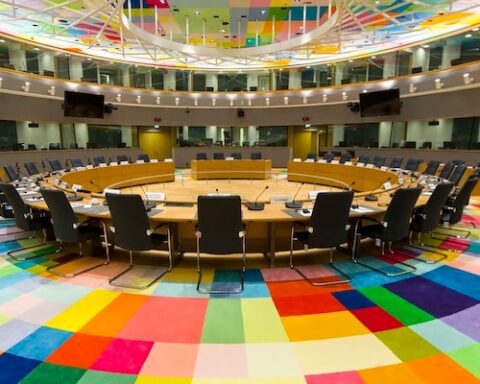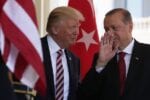Following Saturday’s attack on Syria, French President Emmanuel Macron moved to position himself as the head of Western diplomatic efforts to end the Syrian conflict. In spite of his show of strength, he is facing significant domestic concerns.
Unlike Prime Minister Theresa May in the UK and US President Donald Trump, French President Emmanuel Macron didn’t perform a live address to his nation on Saturday after he ordered missile attacks on Syria. Rather, he sat down on Sunday for a three hour long interview with two leading French Journalists, Jean-Jacques Bourdin and Edwy Plenel.
During this extensive interview, Macron had ample to time to lay out his narrative of the attacks, stating that it was a “military success” and that “chemical weapons production capabilities [of the Syrian regime] have been destroyed.” He characterized the attacks as “legitimately in the multilateral framework,” making them the collective response of the West. “It is the international community that intervened.”
The next morning on Monday, Macron appeared in a joint press conference with Canadian Prime Minister Justin Trudeau. During this meeting, taking questions from global press, Macron laid out his international response – assuring Syria that he was not pushing for the removal of Syrian President Bashar Al-Assad, and encouraging Russia and Turkey to reach out to him to work out a diplomatic response.
In these conversations with the press, Macron appeared to be positioning himself as a power broker for the West, not only making conciliatory overtures to participants in the conflict, but highlighting his ability to influence Western powers.
“Ten days ago, President Trump said the USA’s will is to disengage from Syria. We convinced him that it was necessary to stay,” Macron boasted during the Sunday interview, and went on utilizing the royal “we.” “We convinced him that it was necessary to limit these strikes to chemical weapons sites despite the media frenzy around the tweets, as you may remember.”
L’usage d’armes chimiques met en danger le peuple syrien et notre sécurité à tous. L’intervention armée de cette nuit montre notre détermination. Conseil restreint de défense. pic.twitter.com/SUYJb2JGYy
— Emmanuel Macron (@EmmanuelMacron) April 14, 2018
The rationale for the attack stems from a “red line” which Macron established back in June, threatening Assad with military force if chemical attacks went ahead. His attempt to take the lead in negotiations may succeed, especially because of the political difficulties of the other two participants in the strikes, the US and UK. Russia will need to be included in any diplomatic agreement over Syria. In the UK, the recent poisoning of a former Russian spy has further soured London-Moscow relations (which were already on thin ice due to alleged Russian interference in the Brexit vote). In the US, President Trump faces an ongoing in investigation into alleged collusion with the Russians in his election campaign.
Domestic Concerns
Although Macron doesn’t have a Russia-specific scandal hanging around his neck, that doesn’t mean he is without domestic concerns. Monday afternoon, the French National Assembly held a debate on the Syrian strikes. Although support for the attacks was strong in Macron’s own En Marche party, leaders of other parties were less friendly toward the decision.
“He speaks of the “international legitimacy” that should replace international law, but I’m confused by this concept – there’s only international law,” said Marine Le Pen, the leader of the nationalist-populist National Front party, and the runner up to Macron in the 2017 presidential election.
Le Pen has also criticized the entire rationale for the attack, stating that she didn’t believe in the evidence of the chemical attack.
“We’ve heard many stories like that, which the Americans have been telling us for many years, starting from Colin Powell [former US Secretary of State] with his tiny tube, who claimed there were weapons of mass destruction, which became the rationale for the Iraq war [sic],” said Le Pen. “Everyone today admits that this war was based on a lie, and this was a trap, which, by the way, Jacques Chirac [former French President] did not fall into.”
On the left, the leader of the Socialist party, Jean-Luc Mélenchon, accused Macron of ignoring international and domestic institutions, saying that the attacks were performed without “a UN mandate, a European agreement or a French parliamentary vote.”
And Macron is facing down a serious challenge to his domestic reform agenda. The country’s rail system has been paralyzed by strikes. Macron has sought to curtail the rail workers’ privileges, such as lifetime employment, automatic seniority based pay increases, free travel for their families and a retirement age of 52. Macron’s reforms would only impact new hires. If he backs down French unions will have a blueprint to stop the rest of Macron’s reform plans.
In spite of the pressure, Macron is plowing ahead with his international agenda, and on Tuesday he left his country to address the European Parliament. During the speech he defended his Syria policy, saying that failing to intervene in Syria would be to “cave in to the cynicism.”
And the next day it was off to Germany.
La France et l’Allemagne apportent des réponses communes aux défis d’aujourd’hui. Nous travaillons sur la zone euro, les migrations, l’innovation et les grands dossiers internationaux. pic.twitter.com/9QPELKGAFy
— Emmanuel Macron (@EmmanuelMacron) April 19, 2018
The test of all this diplomatic posturing is scheduled for May 24th, when Macron is scheduled to visit Russia and meet with Russian President Vladimir Putin during the St. Petersburg Economic Forum.
[Title Image: An effigy of Macron during a demonstration in Nantes, France on April 7. (Reuters/Stephane Mahe)]
LIMA CHARLIE NEWS
Lima Charlie provides global news, insight & analysis by military veterans and service members Worldwide.
For up-to-date news, please follow us on twitter at @LimaCharlieNews
In case you missed it:

![Image Macron ignores domestic pressure, attempts take the lead of Western diplomacy in Syria [Lima Charlie News][Image: Reuters / Stephane Mahe](https://limacharlienews.com/wp-content/uploads/2018/04/2018_04_08_43616_1523165065._large-1.jpg)



![Syria’s oil, gas and water - the Immiscible Solution to the War in Syria [Lima Charlie News][Photo: ANDREE KAISER / MCT]](https://limacharlienews.com/wp-content/uploads/2019/05/Syria’s-oil-gas-and-water-480x384.png)




![Blossoming Russo-Turkish alliance leaves U.S., NATO behind [Lima Charlie News]](https://limacharlienews.com/wp-content/uploads/2019/07/Russia-Turkey-alliance-leaves-U.S.-NATO-behind-480x384.png)

